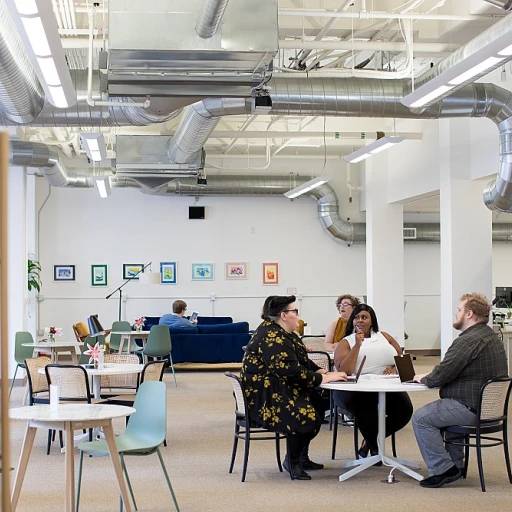
Defining Workplace Services
Recognizing the Scope of Workplace Services
Understanding workplace services is essential in crafting an effective workplace strategy for UK companies. Modern workplace services encompass a range of elements designed to improve the employee experience and overall productivity. Specifically, these services integrate digital solutions such as cloud services and a service desk to ensure seamless operation across the office space. Workplace services aim to enhance the overall work environment by incorporating both physical and digital workplace tools. This integration is crucial as businesses transition into digital workplaces, where the boundary between the physical office and digital collaboration platforms becomes increasingly blurred. Workplace management involves more than just organizing an office space. It requires a strategic approach to manage digital transformation and workplace solutions that enhance productivity. Services provided must address the diversity of ways employees work, fostering a culture of collaboration and efficiency. In a modern workplace, real-time data and digital tools are vital for improving workplace experience and employee engagement. These tools often involve leveraging advanced technologies as guided by the Gartner magic quadrant, aiding in effective workplace management and services. An interesting aspect is how workplace services play a role in enhancing workplace security. To explore potential solutions, such as a magnetic lock for gates, you can visit the detailed post on enhancing security with a magnetic lock for gates. By recognizing the critical role of workplace services, companies can adopt practices that contribute to a more dynamic and responsive business environment.Key Components of Workplace Services
The Elements That Shape an Effective Workplace
In the realm of workplace management, several components play a crucial role in shaping the overall setup of workplace services in UK companies. As businesses adapt to the modern workplace, these components integrate to enhance productivity, collaboration, and the employee experience.- Digital Solutions: The integration of digital workplace tools and technologies is essential for enhancing collaboration and productivity. With the advent of cloud services, digital workplaces have become the norm, enabling employees to work efficiently from any location. Solutions like remote work platforms and digital transformation initiatives are critical in ensuring seamless workplace management.
- Office and Space Management: The effective use of office space can significantly impact employee satisfaction and productivity. Modern workplaces need to provide flexible spaces that promote both individual focus and team collaboration, offering a balanced workplace strategy.
- Service and Support Tools: Service desks and support tools enable employees to address and solve issues in real time. Streamlined workplace digital services ensure that employees work with minimal disruptions, enhancing the overall employee experience.
- Data and Analytics: Utilizing data-driven insights involves using analytics and the information derived from tools like the Gartner Magic Quadrant. These insights help in implementing evidence-based workplace solutions, managing employee needs, and enhancing the workplace experience.
The Impact of Workplace Services on Productivity
Boosting Efficiency with Integrated Solutions
The effective integration of workplace services can significantly enhance productivity within UK companies. With the right workplace strategy, businesses have the potential to create a modern workplace that fosters efficiency and collaboration. As organizations increasingly rely on digital workplaces, the use of cloud services and digital tools plays a pivotal role in shaping the employee experience. Implementing workplace solutions that are tailored to the specific needs of your office space is crucial. This enables seamless collaboration and ensures that employees work in an environment that supports both their professional and personal needs. Moreover, real-time data gathering and analysis allow workplace management teams to make informed decisions that enhance service desk operations. Digital transformation is at the heart of this shift, enabling the seamless integration of remote work and in-office tasks. Companies can leverage workplace digital tools to streamline processes and improve the overall workplace experience, translating into tangible productivity gains. Recognizing the importance of workplace services in an interconnected business environment, the implementation of a robust workplace strategy can align office services with company goals, chartering a path for sustainable growth and employee satisfaction. For companies navigating the complexities of workplace transformation, solutions provided by a magic quadrant from Gartner offer a framework for evaluating the effectiveness of services and tools employed in digital workplaces. This thoughtful approach can guide businesses in optimizing resources and enhancing overall performance. Office managers, in turn, play a crucial role in coordinating these elements, ensuring smooth operations that lead to an enhanced workplace experience.Challenges in Implementing Workplace Services
Addressing the Barriers in Workplace Services Implementation
Implementing an effective workplace services strategy can pose several challenges for UK companies. Recognizing these hurdles enables office managers to devise robust solutions that optimize both the workplace experience and employee productivity. First and foremost, integrating digital solutions into the modern workplace can be daunting. With the rise of digital workplaces and cloud services, ensuring seamless transitions and consistent service delivery is crucial. Implementing the right digital tools requires careful planning and a deep understanding of workplace management, ensuring that employees can collaborate efficiently and work effectively in real time. Moreover, understanding and managing the evolving needs of employees is another critical aspect. Companies must strive to create a responsive and adaptable office space that meets diverse employee expectations. This involves constantly reassessing the workplace strategy to align with technological advancements and employees' work habits. Data security within digital workplaces also represents a significant challenge. As businesses increasingly rely on cloud-based solutions, protecting sensitive work data from potential breaches is paramount. Companies need to adopt robust security measures and invest in secure service desk operations to maintain trust and uphold productivity. Lastly, ensuring a positive workplace experience amidst a rapid digital transformation can be challenging. Employees need adequate training and support to adapt to new systems and tools. This highlights the need for ongoing education and resources to help employees navigate the digital workplace efficiently. Tackling these challenges requires an integrated approach and necessitates regular reviews and updates to workplace solutions, ensuring that services remain relevant and beneficial in promoting a productive work environment within UK companies.Trends in Workplace Services
Embracing Digital Transformation in the Workplace
As UK companies continue to evolve, the integration of digital transformation within workplace services has become a pivotal trend. This shift not only enhances the employee experience but also optimizes workplace management. The adoption of digital workplaces is reshaping how employees work, offering flexible solutions that cater to both remote work and traditional office settings.
Leveraging Cloud Services for Enhanced Collaboration
The use of cloud services is another significant trend, providing real-time access to essential tools and data. This facilitates seamless collaboration among teams, regardless of their physical location. The Gartner Magic Quadrant highlights leading cloud solutions that support this transformation, ensuring that businesses can maintain high levels of productivity and efficiency.
Focus on Employee-Centric Workplaces
Creating a workplace experience that prioritizes employee well-being is gaining traction. Companies are investing in workplace solutions that enhance the overall employee experience, from ergonomic office designs to advanced service desks that address employee needs promptly. This focus not only boosts morale but also contributes to a more productive work environment.
Data-Driven Workplace Strategies
Data plays a crucial role in shaping modern workplace strategies. By analyzing workplace data, companies can make informed decisions about office space utilization, employee preferences, and service improvements. This data-driven approach ensures that workplace services are aligned with business goals and employee expectations.
Adapting to the Modern Workplace
Finally, the trend towards a modern workplace involves continuous adaptation and innovation. Companies are exploring new workplace solutions that integrate emerging technologies, ensuring they remain competitive and responsive to the changing needs of their workforce. This ongoing transformation is essential for sustaining long-term success in the dynamic business landscape.
Best Practices for Office Managers
Adopting a Strategic Approach for Effective Office Management
Office managers play a crucial role in shaping the workplace experience, and implementing best practices in workplace services can significantly enhance productivity and employee satisfaction. Here are some strategies to consider:- Prioritize Employee Experience: Understand the needs and preferences of your employees to create a pleasant and efficient office environment. It's essential to foster a culture of open communication and regularly gather employee feedback on the workplace.
- Embrace Digital Transformation: Leverage digital workplace solutions to streamline operations and enhance collaboration. Incorporating digital tools and cloud services can improve accessibility and productivity, especially in a modern workplace setting where remote work is prevalent.
- Optimize Office Space: Efficient use of office space can boost both morale and productivity. Implement flexible work arrangements and design a workspace that accommodates diverse work styles. Workplace strategy should emphasize a balance between open and quiet areas to cater both to collaboration and focused work.
- Utilize Data-Driven Insights: Harness data to make informed decisions regarding workplace management. Real-time data can help in understanding space utilization, thereby enabling better management and planning.
- Focus on Workplace Collaboration: Encourage collaboration through well-thought-out workplace solutions. Digital workplaces should offer tools that facilitate seamless communication and team interaction.
- Continuous Improvement: Regularly assess and refine workplace services to align with the evolving needs of the business and its employees. Stay informed about trends and innovations in workplace management, as noted in leading industry publications such as the Gartner Magic Quadrant.
- Service Desk Integration: Ensure a strong service desk that efficiently handles requests and issues, helping employees focus on productive work without unnecessary disruptions.


-large-teaser.webp)










